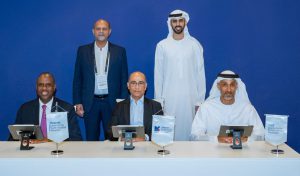DUBAI/WAM
The UAE, Malaysia, and Rwanda signed a strategic partnership to strengthen coordination to help boost AI adoption in the Global South.
Within the framework of the Centre for the Fourth Industrial Revolution (C4IR) global network, the countries will work together to promote ethics and governance in AI to help societies and economies in the Global South harness its potential.
Through a signing a Memorandum of Understanding, the countries agreed to expand the scope of the C4IR AI Fellowship Programme, which was initially signed by the UAE and Rwanda at the 2024 World Economic Forum (WEF) Annual Meeting in Davos. The knowledge exchange platform was created to connect leaders, innovators, and experts in the AI space.
Now, with the addition of Malaysia, the expanded partnership will promote further international cooperation to support sustainable development through AI. The initiative will enable talent exchange, joint initiatives, and coordinated development of responsible AI governance frameworks led by Global South nations.
The new agreement was witnessed by Omar Al Olama, Minister of State for Artificial Intelligence, Digital Economy, and Remote Work Applications, and Gobind Singh Deo, Minister of Digital in Malaysia.
Gobind Singh Deo said, “Malaysia is proud to join forces with the UAE and Rwanda in this visionary initiative to bridge global AI expertise and accelerate digital transformation for a more inclusive and sustainable future. This partnership involving Malaysia Centre4IR, C4IR UAE, and C4IR Rwanda reflects our collective goal for a future that is driven by responsible AI innovation.”
Singh Deo added, “We hope that the C4IR Network AI Fellowship Programme, resulting from this collaboration, will serve as a vital bridge, connecting AI leaders and experts across continents. By sharing knowledge, exchanging talent, and co-creating solutions, we aim to address the critical challenges and harness the immense potential of AI for the benefit of not only our nations, but the wider global community.”
Khalfan Belhoul, CEO of DFF, said, “This expanded partnership will help the Global South to unlock greater value from AI and Fourth Industrial Revolution applications. Guided by our leadership, the UAE is committed to building and strengthening global collaboration to achieve inclusive, sustainable development through technology and knowledge sharing.”
Aytug Goksu, Head of Network and Government Affairs at C4IR Network and Partner Engagement at World Economic Forum, said, “The signing of this MoU marks a significant milestone in our shared journey to harness the transformative power of AI. By bringing together the shared expertise and vision of the Centres for the Fourth Industrial Revolution in the UAE, Rwanda, and Malaysia, we are connecting a global community of AI practitioners committed to advancing inclusive and sustainable progress.”
Crystal Rugege, Managing Director of the Rwanda Centre for the 4th Industrial Revolution, said, “We are delighted to deepen our engagement within the global C4IR network through the expansion of the AI Fellowship Programme. This strategic partnership complements our flagship initiatives, including the AI Innovation Lab and the Global AI Summit on Africa, enhancing our collective ability to foster cutting-edge research, knowledge transfer, and capacity building.
“By strengthening responsible AI governance and accelerating practical AI adoption, we are committed to empowering Rwanda, our partner countries, and the global AI ecosystem to fully leverage AI for sustainable and inclusive development.”
The UAE Centre for the Fourth Industrial Revolution (UAE C4IR), overseen by DFF and launched in April 2019 in a partnership between the UAE Government and WEF, plays a key role in facilitating collaboration and exchange. Over the past six years, the centre has forged several impactful partnerships and initiatives.
The Global Centre for the Fourth Industrial Revolution Network is a platform for multistakeholder collaboration, bringing together public and private sectors to maximise technological benefits to society while minimising the risks. It explores exponential technologies and drives their responsible adoption and application, leveraging a global network of independent national and thematic centres.
 The Gulf Time Newspaper One of the finest business newspapers in the UAE brought to you by our professional writers and editors.
The Gulf Time Newspaper One of the finest business newspapers in the UAE brought to you by our professional writers and editors.
